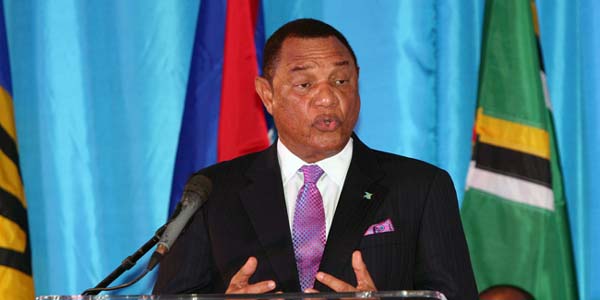
Intervention by
The Rt. Hon Perry Christie,
Prime Minister of the Commonwealth
Of The Bahamas
At the 7th Summit of The Americas
Panama City, Panama
April 11th, 2015
Your Excellencies, Distinguished Colleague Heads of Government and State,
Mr. President,
Let me thank you for your warm welcome here. I am pleased to be here. Today we are gathered with all the nations of the Americas; no nation is absent from the table. That is a good thing. We welcome especially therefore the rapprochement between the United States and Cuba which makes this historic assembly possible. It is our hope for a speedy progression towards normal relations between the two immediate neighbours of The Bahamas: the United States and Cuba.
Mr. President,
As we reflect on the state of the hemisphere today – the still fragile global economy, the growing threats of climate change, the pervasive scourge of transnational organized crime, poverty and social and economic inequality – the importance of this forum of the Summit of the Americas, and in particular the theme – “Prosperity with equity: challenges to cooperation” – renders itself particularly timely.
I wish to share some thoughts particularly in the areas of migration, climate change, development financing and youth delinquency.
Migration
Mr. President,
The Bahamas, a country of some 370,000 persons scattered across 700 islands and cays and an expansive 100,000 square miles of territory, a country inextricably bound by geography, continues to grapple with regional irregular migration, a problem which precipitates dangers at sea for migrants and facilitates criminal enterprises for trafficking and smuggling of persons.
I make the point here that more must be done to stop irregular migration. On our own, we are dedicated to managing these issues by stopping the breaching of our borders, preventing our territory from being used as a conduit for smugglers and traffickers and ensuring a safe and humane return for all who come to us by breaching our borders without documentation.
We do not apologise for the actions we take to manage this problem and return these migrants home. Irregular migration is an existential threat to The Bahamas. Right now, we commit hundreds of millions of dollars to stop this assault on our country. Yet only one side of the story is being told. There must be a balanced approach on this issue. Too often there is a portrayal on this issue that does not admit to the fact that there is an international, sophisticated criminal enterprise that is driving these irregular migration efforts through The Bahamas. The Bahamas is dedicated to stopping this criminal enterprise before its stops us. I want it to be clear at this forum how strong we are on this matter. We will be calling upon all states adjacent to us and in the hemisphere to help to stop this smuggling and trafficking.
While the human rights of migrants must and always be protected, we draw attention to the responsibility of bordering states to the Bahamas to stop this illegal migration.
The present trend in illegal migration to and through The Bahamas cannot persist. It is unsustainable. We therefore see a unique opportunity for the region and hemisphere to cooperate on the issue of irregular migration and to facilitate burden sharing on solutions to the challenge. We see dialogue as a necessary first step, particularly through the development of regional consultative mechanisms, and welcome the support of the OAS, the International Organization for Migration and other interested institutions to support such efforts.
I would be remiss if I do not express my concerns with regard to regular migration as well. Too many of our citizens leave their countries of origin for other countries, leaving behind a deficit in the talents to help develop their home countries. The Caribbean region suffers from this. I have spoken to this issue in China, in the United States, most recently in Jamaica at a Caricom/US Summit and in the United Nations. I speak up for your young people who are our future but who in too many instances are driven to leave our countries for other shores, taking with them the investments in their education and their God given talents.. I have said and I repeat it, we must focus on eliminating their sense of hopelessness, their joblessness. If fail to address it, we do so at our peril.
Clearly, the issues of the growth and development of our economies is the central factor in addressing this. I also think that the Diasporas of our respective countries can be better utilized to assist in the development of their home countries. The Bahamas commits to working with all countries to address this issue.
Climate Change
Mr. President,
It is a stark reality that if the sea level rises five feet, 80 per cent of The Bahamas would disappear. Inaction on the climate change issue provides us with that promised scary result. Climate change is real for The Bahamas and threatens its very existence.
We commend recent communications of tangible commitments by several states, in particular the agreements on climate change issues by the United States and China. As a Small Island Developing State (SIDS), we underscore our firm belief that any negotiated outcome in Paris later this year must include binding commitments and take into account the special circumstances of small and vulnerable states. The Bahamas and small states will do their part but there is a moral imperative for the developed countries to shoulder their full responsibilities in this matter. In Paris this year, we must live out the true meaning of that moral imperative by binding commitments toward tackling this issue.
Development Financing
Mr. President, for my Country, and certainly for the CARICOM Region, there are few things more relevant and meaningful to a government’s capacity to enable prosperous and equitable societies than access to development financing. What we find, however, is that too often the issues of credit worthiness and development needs have been obscured and thus institutions that exist to aid development fall short of their missions. I again say that decisions on development financing should not be based on that of GDP per capita, which measure does not fully account for the real development and governance issues in small and vulnerable developing states.
The Bahamas has a high GDP capita, but it also has a small population over 26 different islands. We therefore have to maintain some 54 airports, 20 of which are international airports, over 100 public health care facilities and more than 150 public schools. The challenges are enormous.
We commend recent reforms at the IDB to introduce vulnerability assessments into their lending decision-making criteria and welcome recent moves by governments, such as the United States, to reform criteria for aid and financing for energy projects, climate change financing and disaster risk management in the region. Deeper reforms are required still, however, across the international financial system in order to institutionalize more fair and equitable decision-making. We ask the countries amongst us who have considerable influence on decision making processes in these institutions to support these necessary reforms.
These policy reforms must extend to the IMF and to the World Bank as well.
Youth Delinquency
Mr. President,
Addressing violent crime is central to domestic peace and survival of the countries of the hemisphere, and the proliferation of gang activity, illicit drugs, and small arms and ammunition trafficking are of particular concern for my country. We do not manufacture weapons nor do we form the demand for the drugs that find their way to our shores, yet, again, we are bound by geography, to confront these challenges. While existing regional security cooperation against transnational threats is commendable, greater regional cooperation to mitigate transnational crime in the hemisphere is required and we endorse the UN Arms Trade Treaty, as a potentially valuable tool in these efforts.
Too often as policy makers, however, we do not really grapple with root causes of the problems that we face. The challenge of chronic high youth unemployment across the hemisphere, particularly for our young males and other vulnerable groups, alongside the challenges these groups face for equitable educational attainment, creates the context for juvenile delinquency and eventually lives of criminality.
The Bahamas believes that social intervention can be a pre-emptive strike to prevent juvenile delinquency, particularly when the focus is on employment and education. We have therefore implemented programmes, such as the Urban Renewal Initiative, which seek to engage and reinvigorate our urban communities. The Ministry of Education has embarked upon a policy programme that focuses on raising the educational attainment amongst the bottom 50% of those in our public school systems. In an effort to both diversify our domestic economy and facilitate greater integration of young people into our economy, the Government has also recently established an Agriculture and Marine Science Institute, which we hope will also enhance our self- sufficiency and concretize agricultural production as a pillar of our economy.
Conclusion
Mr. President,
Our challenges, individually and collectively, are many but they are not insurmountable and where no one State can unilaterally solve the greatest challenges facing the hemisphere, our collective will to work together has the capacity to transform the hemisphere into the Americas that we want. In order for the fruit of our cooperation to be sustainable, however, our goals must be practical, seek to address real as opposed to ideologically perceived needs. I am a pragmatist. I look at the world and I say: what do we do to solve this problem. Once we see the way, I say let us move to solve it. Ideology has its place but my experience tells me that our peoples just want solutions.
Let’s commit ourselves today to finding and implementing solutions. There has been too much talk. There is enough talk. Let’s get to work in finding, crafting and executing the solutions.
I thank you.







